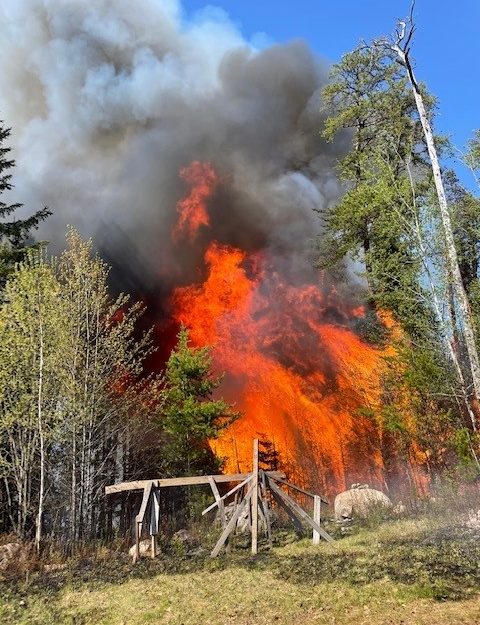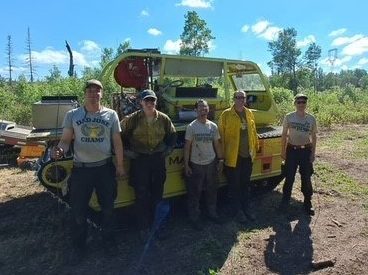Fighting the Wildfires

By Molly Urban, Southern Field Specialist / AmeriCorps Member
I’ve had a total of 24 days on wildfire response so far this year, and it’s completely changed how I’m planning my career trajectory. I’ve gotten the chance to participate in all aspects of wildfire response, like initial attack, mop up, and camp logistics. Each have been rewarding in their own way.
I got to be a part of one of the flashiest parts of wildland firefighting—initial attack. My crew member and I were in one of the first two engines on the scene of a wildfire near Ban Lake in northern Minnesota. We rolled up on a stand of conifers torching. The flame lengths were around 50-60ft high. I snapped a couple of pictures while our Incident Commander was calling in air support.

We had the opportunity to build progressive hose lays off a floating pump, and I was lucky that I had S-212 saw training with the Corps this past spring so that I could be a sawyer on the fire line. A big part of my job that day was felling hazard trees away from the fire line and into the black so they wouldn’t cause spot fires, fall across the line, or endanger other firefighters. It was one of my favorite experiences sawing that I’ve ever had. My crew member (Eli Been) was a great partner to have on the fire, and he was responsible for saving a small yurt that was on the property. It was a great learning experience for both of us and gave us new aspirations for a career in wildfire.

I’ve been on mop up for fires as small as a quarter acre to ones as big as 300 acres. A lot of it is gridding the area for smokes and heat and using your nose and your hands to make sure everything is completely out. I’ve gained a lot of experience using slip-on engines to deploy water in wildfire scenarios (in the past I’d only used slip-ons during prescribed burns), carrying bladder bags to places inaccessible to engines, working with heavy machinery and track vehicles, operating a chainsaw to fell hazard trees, and using hand tools to dig up roots and break up logs that are still on fire. I love the way that teamwork is highlighted during mop up; you work close to your crew and must constantly communicate with them to make sure everyone is on the same page.
Camp logistics is often a thankless job, but someone must do it, or things will fall apart at base camp. In my experience it has meant serving meals, picking up and taking out trash, filling up coolers, helping supply fill orders, rolling hose, and making red bags and green bags for crews to take out on the line.

My favorite part of this experience was all the amazing people you get to meet while working on a fire. The networking opportunities are huge, and the people you meet are so willing to help you find jobs after your time with the Corps is over. I have had multiple people offer resumé help, give career advice, and send me job postings they think I should apply for.

Overall, I have to say that being on fire opens so many new career paths and new opportunities that I would’ve had no access to or knowledge of. It’s such a great foot in the door in an industry that is extremely competitive and wildly rewarding.